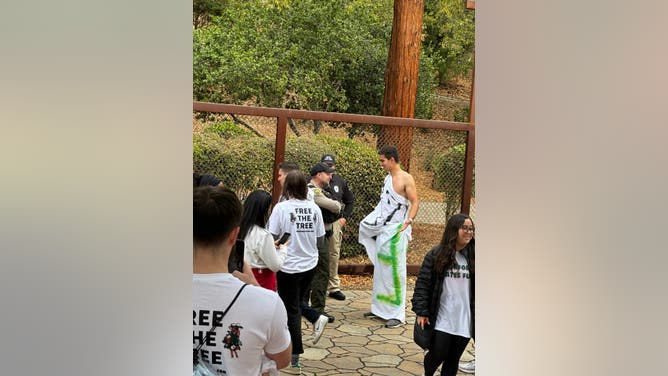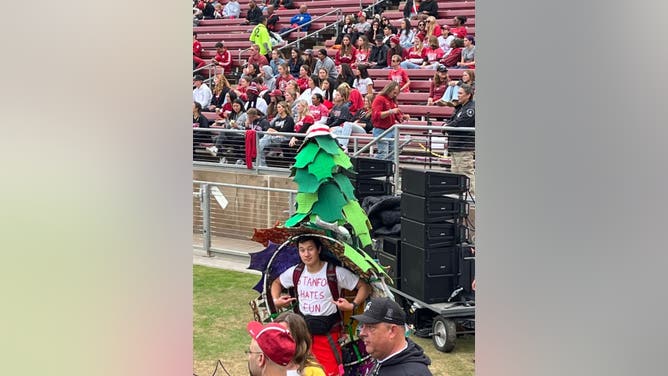Stanford Student Group To Take Legal Action Against University For Suppressing Free Speech At Football Game Amid Larger 'War On Fun'
A group of Stanford students that call themselves 'Stanford Hates Fun' plan to take legal action against the university for allegedly suppressing free speech. The incidents occurred at a football game between the Cardinal and Washington State Cougars on Saturday and correlate directly to a larger conversation about social life suppression on campus.
Stanford Hates Fun and its movement stem from a recent suppression of social functions by university administration. Students claim that the school has repeatedly exerted pressure to restrict student social life through a lack of communication, an adversarial approach to party registration and funding, and strict policies.
According to multiple students, the new, excessively bureaucratic approach makes it difficult to register on-campus social events with the university. This includes, but is not remotely limited to, Greek life.
Numbers seemingly back up that claim.
In 2019, the last school year without COVID-19 restrictions, 158 on-campus parties were registered with the university during the first month of the fall quarter. In 2022, just 45 parties were registered on campus during the first month of the fall quarter.
The school's student newspaper The Stanford Daily provides a great look at the entire situation from a first-hand perspective. Tensions continue to mount over the university's handling of social life.
The Stanford Hates Fun movement was born because of the administrative crackdown.
During Stanford's home football game against Arizona State, the Leland Stanford Junior University Marching Band — which is notoriously goofy and puts fun at the forefront — unfurled a banner alongside the school's legendary Tree mascot. It read, simply, 'STANFORD HATES FUN.'
In response to the sign, Jordan Zietz was from the band. Zietz was wearing the tree suit and helped to hold the banner.
Despite an initial tweet claiming otherwise, he was suspended by the Band Executive Committee, not the university. The committee told The Stanford Daily that they decided to suspended Zietz "because of his use of the platform for personal benefit without going through or inquiring about appropriate processes." It said that the decision was unrelated to the 'War On Fun.'
However, it is hard to imagine that Stanford was not breathing down the committee's neck. Would the same decision have been made without mounting university pressure?
Regardless of who made the decision, it only increased the anti-administration narrative. The Stanford Hates Fun movement ramped up even more.
Students claim the university suppressed their free speech on Saturday.
While the 'War On Fun' continues, a fairly large group of Stanford students — especially in relation to the minimal, practically nonexistent crowd elsewhere in the stands — were in attendance at the Cardinal's blowout loss to Washington State. Many of them wore #FreeTheTree shirts, others wore shirts in support of Stanford Hates Fun. They also held up the initial sign that ultimately resulted in the Tree's suspension.
As they did, security converged on the student section.
Video from the game appears to show an increased presence of armed police and unarmed campus security for a game with a very small crowd. Many of them were positioned at and/or around the student entrances.
Stanford Hates Fun claims that the issue goes deeper. It claims that Stanford violated its free speech responsibilities under California's Leonard Law and plans to "follow up through the appropriate legal channels."
The group says that students were restricted from entering the football game with anti-administration signs and banners, regardless of size or format.
Signs are not prohibited at the football.
Stanford Stadium has posted a list of prohibited items online and at the entrance, and the list does not include signage. At a game earlier this month, stadium staff even handed out signs to spectators.
However, the students' signs were not allowed on Saturday.
"When we asked why they were prohibiting signs, we received different answers from different staff. We therefore have reason to believe that these signs were prohibited specifically because of their content."
Stanford Hates Fun also claims that security made students partially disrobe to confirm that they were not carrying any signage. Images from the game show students being confronted by officers as they tried to enter the stadium.

Image courtesy: Stanford Hates Fun
One banner was brought into the game.

Image courtesy: Stanford Hates Fun
However, it came through a non-student entrance. The Stanford Hates Fun group believes that the security at other entrances were "not briefed on the planned censorship."
Security and Stanford administrators attempted to remove the banner, but were deterred by the crowd's support. The replacement mascot installed by the administration also wore a shirt that said "Stanford Hates Fun."

Image courtesy: Stanford Hates Fun
In addition, many band members chose to boycott the band on Saturday. Many of the band members who did play during the game protested with the 'Stanford Hates Fun' slogan brandished on their t-shirts and instruments.
Stanford students do not plan to go quietly. They will continue to fight for their right to party.
OutKick reached out to the university for comment but did not hear back.